Culture of England
| Culture of England |
|---|
 |
| History |
| People |
| Languages |
| Traditions |
|
Mythology and folklore
|
| Cuisine |
|
Festivals
|
| Religion |
| Art |
| Literature |
|
Music and performing arts
|
|
Media
|
|
Monuments
|
|
|
The culture of England is defined by the idiosyncratic cultural norms of England and the English people. Owing to England's influential position within the United Kingdom it can sometimes be difficult to differentiate English culture from the culture of the United Kingdom as a whole.
Architecture and gardens

English architecture begins with the architecture of the Anglo-Saxons. At least fifty surviving English churches are of Anglo-Saxon origin, although in some cases the Anglo-Saxon part is small and much-altered. All except one timber church are built of stone or brick, and in some cases show evidence of reused Roman work. The architectural character of Anglo-Saxon ecclesiastical buildings ranges from Coptic-influenced architecture in the early period, through Early Christian basilica influenced architecture, to (in the later Anglo-Saxon period) an architecture characterized by pilaster-strips, blank arcading, baluster shafts and triangular-headed openings. Almost no secular work remains above ground.
Other buildings such as cathedrals and parish churches are associated with a sense of traditional Englishness, as is often the palatial 'stately home'. Many people are interested in the English country house and the rural lifestyle, evidenced by the number of visitors to properties managed by English Heritage and the National Trust.
Landscape gardening as developed by Capability Brown set an international trend for the English garden. Gardening, and visiting gardens, are regarded as typically English pursuits.
Art
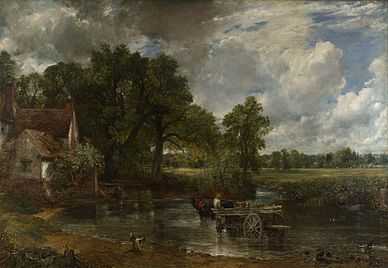
English art was dominated by imported artists throughout much of the Renaissance, but in the 18th century a native tradition became much admired. It is often considered to be typified by landscape painting, such as the work of J.M.W. Turner and John Constable. Portraitists like Thomas Gainsborough, Joshua Reynolds and William Hogarth are also significant. Hogarth also developed a distinctive style of satirical painting.
Cuisine
Since the early modern era, the food of England has historically been characterised by its simplicity of approach, honesty of flavour, and a reliance on the high quality of natural produce. This has resulted in a traditional cuisine which tended to veer from strong flavours, such as garlic, and an avoidance of complex sauces which were commonly associated with Catholic Continental political affiliations.[1] Traditional meals have ancient origins, such as bread and cheese, roasted and stewed meats, meat and game pies, and freshwater and saltwater fish. The 14th-century English cookbook, the Forme of Cury, contains recipes for these, and dates from the royal court of Richard II.
Modern English cuisine is difficult to differentiate from British cuisine as a whole. However, there are some forms of cuisine considered distinctively English. The Full English Breakfast is a variant of the traditional British fried breakfast. The normal ingredients of a traditional full English breakfast are bacon, eggs, fried or grilled tomatoes, fried mushrooms, fried bread or toast, and sausage, usually served with a cup of coffee or tea. Black pudding is added in some regions as well as fried leftover mashed potatoes called potato cakes or hash browns. Another well known English dish, English Christmas dinner traditionally consists of turkey which first appeared on the English Christmas dinner table in 1573, and is often accompanied with roast beef or ham, and served with stuffing, gravy, roast potatoes and vegetables.[2]
Tea and beer are typical and rather iconic drinks in England, particularly the former. Traditionally, High Tea would be had as a separate meal. Cider is produced in the West Country and, more recently, East Anglia and the south of England has seen the reintroduction of vineyards producing white wine on a small scale.
Roast beef is a food traditionally associated with the English; the link was made famous by Henry Fielding's patriotic ballad "The Roast Beef of Old England", and William Hogarth's painting of the same name. Indeed, since the 1700s the phrase "les rosbifs" has been a popular French nickname for the English.[3]
England produces hundreds of regional cheeses, including:
- Cheddar cheese
- Stilton cheese
- Wensleydale cheese
- Lancashire cheese
- Dorset Blue Vinney cheese
- Cheshire cheese
- Double Gloucester cheese
- Red Leicester
- Blue cheese
More dishes invented in or distinctive to England include:
- The English crumpet is a form of crumpet; it is distinguished from its Scottish equivalent by its greater thickness
- Muffins, known as 'English muffins' in North America, are a form of rounded, yeast-leavened bread
- Lancashire hotpot
- Crumpets
- Mushy peas
- Beef Wellington
- Worcester sauce
- Clotted cream from Devon and Cornwall
- Yorkshire pudding
- Sausage and mash
- Eccles cake
- Cumberland sausage
- Lincolnshire sausage
- Balti, a form of curry invented in Birmingham
- Apple pie
- Banoffee pie
Folklore
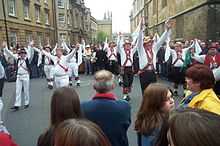
English folklore is the folk tradition that has evolved in England over the centuries. England abounds with folklore, in all forms, from such obvious manifestations as semi-historical Robin Hood tales, to contemporary urban myths and facets of cryptozoology such as the Beast of Bodmin Moor. The famous Arthurian legends may not have originated in England, but variants of these tales are associated with locations in England, such as Glastonbury and Tintagel.
Examples of surviving English folk traditions include the Morris dance and related practices such as the Abbots Bromley Horn Dance and the Mummers Play. In many, usually rural places, people still gather for May Day festivals on the first of May to celebrate the beginning of summer. This traditionally involves local children skipping around a maypole - a large pole erected on the village green (historically a tree would have been specially cut down) - each carrying a coloured ribbon, resulting in a multi-coloured plaited pattern. The festival traditionally features Morris dancing and various festivities, culminating in the crowning of a 'May Queen'. Many regional variations of the festivals exist; the oldest still practised today is the "'Obby 'Oss festival of Padstow, which dates back to the 14th century.
The utopian vision of a traditional England is sometimes referred to as Merry England.
Law
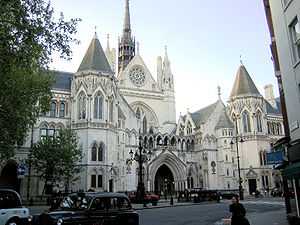
English law is the legal system of England and Wales.[4] Due to the British Empire, it has been exported across the world: it is the basis of common law[5] jurisprudence of most Commonwealth countries, and English law prior to the American revolution is still part of the law of the United States, except in Louisiana. The 18th century English jurist, judge and politician William Blackstone is best known for his seminal work, Commentaries on the Laws of England, containing his formulation: "It is better that ten guilty persons escape than that one innocent suffer", a principle that government and the courts must err on the side of innocence, which has remained constant.[6]
Literature

English literature begins with Anglo-Saxon literature, which was written in Old English. For many years, Latin and French were the preferred literary languages of England, but in the medieval period there was a flourishing of literature in Middle English; Geoffrey Chaucer is the most famous writer of this period. The Elizabethan era is sometimes described as the golden age of English literature, as numerous great poets were writing in English, and the Elizabethan theatre produced William Shakespeare, often considered the English national poet.
Due to the expansion of English into a world language during the British Empire, literature is now written in English across the world. Writers often associated with England or for expressing Englishness include Shakespeare (who produced two tetralogies of history plays about the English kings), Jane Austen, Arnold Bennett, and Rupert Brooke (whose poem "Grantchester" is often considered quintessentially English). Other writers are associated with specific regions of England; these include Charles Dickens (London), Thomas Hardy (Wessex), A. E. Housman (Shropshire), and the Lake Poets (the Lake District). In the lighter vein, Agatha Christie's mystery novels are outsold only by Shakespeare and The Bible.
Music

England has a long and rich musical history. The United Kingdom has, like most European countries, undergone a roots revival in the last half of the 20th century. English music has been an instrumental and leading part of this phenomenon, which peaked at the end of the 1960s and into the 1970s.
The achievements of the Anglican choral tradition following on from 16th-century composers such as Thomas Tallis, John Taverner and William Byrd have tended to overshadow instrumental composition. The semi-operatic innovations of Henry Purcell did not lead to a native operatic tradition, but George Frideric Handel found important royal patrons and enthusiastic public support in England. The rapturous receptions afforded by audiences to visiting musical celebrities such as Haydn often contrasted with the lack of recognition for home-grown talent. However, the emergence of figures such as Edward Elgar and Arthur Sullivan in the 19th century showed a new vitality in English music. In the 20th century, Benjamin Britten and Michael Tippett emerged as internationally recognised opera composers, and Ralph Vaughan Williams and others collected English folk tunes and adapted them to the concert hall. Cecil Sharp was a leading figure in the English folk revival.
Finally, a new trend emerged from Liverpool in 1962. The Beatles became the most popular musicians of their time, and in the composing duo of John Lennon and Paul McCartney, popularized the concept of the self-contained music act. Before the Beatles, very few popular singers composed the tunes they performed. The "Fab Four" opened the doors for other English acts such as the Rolling Stones, Cream, The Hollies, The Kinks, The Who, Queen, Led Zeppelin, Black Sabbath, Genesis, Iron Maiden, The Police and Pink Floyd to the globe.
Some of England's leading contemporary artists include Eric Clapton, Elton John, George Michael, Sting, The Smiths, The Spice Girls, Oasis, Blur, Radiohead, David Bowie, Depeche Mode, Def Leppard, Robbie Williams, Coldplay, Muse, Mumford and Sons, Amy Winehouse, Adele, Ed Sheeran, Sam Smith and One Direction.
Philosophy
English philosophers include Francis Bacon, Sir Thomas More, John Locke, Thomas Hobbes, Thomas Paine, Jeremy Bentham, John Stuart Mill and Bertrand Russell.
Religion
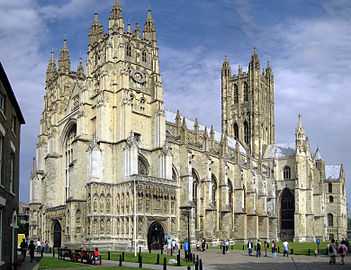
In England, Christianity became the most practiced religion centuries ago. Polytheistic religions, often referred to as paganism, were practiced before Christianity took hold. These religions include Celtic polytheism, Norse paganism, Roman polytheism, and others. Some were introduced by the Anglo-Saxons, who had their origins in ancient Germanic tribes.
Christianity was first introduced through the Romans. Legend links the introduction of Christianity to England to the Glastonbury legend of Joseph of Arimathea; see also the legend of Saint Lucius. Archaeological evidence for Christian communities begins to appear in the 3rd and 4th centuries. The Romano-British population after the withdrawal of the Roman legions was mostly Christian.
Christianity was reintroduced into England by missionaries from Scotland and from Continental Europe: the era of St Augustine (the first Archbishop of Canterbury) and the Celtic Christian missionaries in the north (notably St. Aidan and St. Cuthbert). The Synod of Whitby in 664 ultimately led to the English Church being fully part of Roman Catholicism. Early English Christian documents from this time include the 7th century illuminated Lindisfarne Gospels and the historical accounts written by the Venerable Bede. The Durham Gospels is a Gospel book produced at Lindisfarne.
In 1536, the Church in England split from Rome over the issue of the divorce (technically, the marriage annulment) of King Henry VIII from Catherine of Aragon. The split led to the emergence of a separate ecclesiastical authority. Later the influence of the Reformation resulted in the Church of England adopting its distinctive reformed Catholic position known as Anglicanism. For more detail of this period see the following article: Timeline of the English Reformation.
Today, the Church of England is the established church in England. It regards itself as in continuity with the pre-Reformation state Catholic church (something the Roman Catholic Church does not accept) and has been a distinct Anglican church since the settlement under Elizabeth I (with some disruption during the 17th-century Commonwealth period). The British Monarch is formally Supreme Governor of the Church of England. Its spiritual leader is the Archbishop of Canterbury, who is regarded by convention as the head of the worldwide Anglican Communion. In practice the Church of England is governed by the General Synod, under the authority of Parliament. The Church of England's mission to spread the Gospel has seen the establishment of many churches in the Anglican Communion throughout the world particularly in the Commonwealth of Nations.
A strong tradition of Methodism developed from the 18th century onward. The Methodist revival was started in England by a group of men including John Wesley and his younger brother Charles as a movement within the Church of England; it developed as a separate denomination after John Wesley's death. Other non-conformist Protestant traditions were also established in England.
Saint George is recognised as the patron saint of England. Before Edward III, St Edmund was recognised as England's patron saint, and the flag of England consists of the cross of St George. However, Saint Alban is venerated by some as England's first Christian martyr.
Language

English people traditionally speak the English language, a member of the West Germanic language family. The modern English language evolved from Old English, with lexical influence from Norman-French, Latin, and Old Norse. There were once many different dialects in England - which were recorded in projects such as the English Dialect Dictionary and the Survey of English Dialects - but many of these have passed out of usage as Standard English has spread through education, the media and socio-economic pressures.[7]
Cornish, a Celtic language originating in Cornwall, is currently spoken by about 3,500 people as a second language. Historically, another Brythonic Celtic language, Cumbric, was spoken in Cumbria in North West England, but it died out in the 11th century although traces of it can still be found in the Cumbrian dialect. Because of the 19th century geopolitical dominance of the British Empire and the post-World War II hegemony of the United States, English has become the international language of business, science, communications, aviation, and diplomacy.
Science
The English have played a significant role in the development of science and engineering. Prominent individuals have included Roger Bacon, Francis Bacon, William Harvey, Robert Hooke, Isaac Newton, Henry Cavendish, Isambard Kingdom Brunel, Francis Crick, Abraham Darby, Michael Faraday, Charles Darwin, James Chadwick, Joseph Swan, Barnes Wallis, Alan Turing, Frank Whittle, Sir Tim Berners-Lee and Stephen Hawking. Furthermore, it is home to the Royal Institution, the Royal Society, the Greenwich Observatory and its associated meridian.
Surnames
| Rank | Surname | Origin | Percentage[8] |
|---|---|---|---|
| 1 | Smith | England | 1.44 |
| 2 | Jones | England and Wales | 0.75 |
| 3 | Taylor | England and Scotland | 0.59 |
| 4 | Brown | Scotland | 0.56 |
| 5 | Williams | England and Wales | 0.39 |
| 6 | Wilson | Scotland and England | 0.39 |
| 7 | Johnson | England | 0.37 |
| 8 | Davis | Wales | 0.34 |
| 9 | Robinson | England | 0.32 |
| 10 | Wright | England | 0.32 |
| 11 | Thompson | England | 0.31 |
| 12 | Evans | Wales | 0.30 |
| 13 | Walker | England | 0.30 |
| 14 | White | England | 0.30 |
| 15 | Roberts | England | 0.28 |
| 16 | Green | England | 0.28 |
| 17 | Hall | England | 0.28 |
| 18 | Wood | England and Scotland | 0.27 |
| 19 | Jackson | England and Scotland | 0.27 |
| 20 | Clarke | England | 0.26 |
Sport and leisure
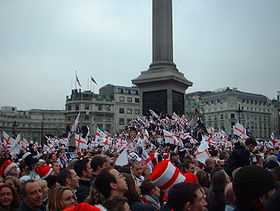
There are many sports which have been codified by the English, and then spread worldwide, including badminton, cricket, croquet, football, field hockey, lawn tennis, rugby league, rugby union, table tennis and thoroughbred horse racing. In the late 18th century, the English game of rounders was transported to the American Colonies, where it evolved into baseball. Association football, cricket, rugby union and rugby league are considered to be the national sports of England.
The rules of football were first drafted in 1863 by Ebenezer Cobb Morley, and England has the oldest football clubs in the world.[9] The first ever international football match was between England and Scotland in 1872.[10] The "home of football", England hosted the 1966 FIFA World Cup, and won the tournament.[11] The English Barclays Premier League is the most-watched football league in the world.[12] As is the case throughout the UK, football in England is renowned for the intense rivalries between clubs and the passion of the supporters, which includes a tradition of football chants, such as, "You're Not Singing Any More" (or it's variant "We Can See You Sneaking Out!"), sung by jubilant fans towards the opposition fans who have gone silent (or left early).[13][14]
England, and other countries in the United Kingdom, compete as a separate nations in some international sporting events, especially in football, cricket, rugby league and rugby union. The England cricket team actually represents England and Wales.[15] However, in the Olympic Games, England competes as part of the Great Britain team. English supporters are now more likely to carry the Cross of Saint George flag than the British Union Flag.[16]
Football maintains a consistent popularity across the country and is often indicative of trends across wider culture in England, such as in clothing and music. Different sports directly represent the different social classes within England. Rugby league, for instance, was traditionally associated with the old mill towns of north-west England, whereas cricket and rugby union have their origins in the private schools of the 18th and 19th centuries respectively.
Tennis is also a major sport, with one of the sport's most internationally prestigious tournaments being held at Wimbledon.
Symbols

The English use as their national flag the red cross of St George. The three golden lions on a red background was the banner of the kings of England derived from their status as Duke of Normandy and is now used to represent the English national football team and the English national cricket team, though in blue rather than gold. The English oak and the Tudor rose are also English symbols, the latter of which is (although more modernised) used by the England national rugby union team.
St George's Day in England is marked as the day of the patron saint, and is also celebrated as the day of birth and death of William Shakespeare.
England has no official anthem; however, the United Kingdom's "God Save the Queen" is commonly used. Other songs are sometimes used, including "Land of Hope and Glory" (used as England's anthem in the Commonwealth Games), "Jerusalem", "Rule Britannia", and "I Vow to Thee, My Country". Moves by certain groups are encouraging adoption of an official English anthem following similar occurrences in Scotland and Wales.[17][18]
See also
References
- ↑ P.474,Society and Religion in Elizabethan England, Richard L. Greaves ISBN 978-0-8166-1030-3 here
- ↑ Emett, Charlie (2003) "Walking the Wolds". Cicerone Press Limited, 1993
- ↑ Why do the French call the British 'the roast beefs'?
- ↑ Jurisdiction Of Courts In England And Wales And Their Recognition Of Foreign Insolvency Proceedings
- ↑
- ↑ "Sir William Blackstone". Britannica. Retrieved 29 April 2015.
- ↑ Wolfgang Vierick (1964), Der English Dialect Survey und der Linguistic Survey of Scotland - Arbeitsmethoden und bisherige Ergebnisse, Zeitschrift fuer Mundartforschung 31, 333-335 in Shorrocks, Graham (1999). A Grammar of the Dialect of the Bolton Area, Part 1. Frankfurt am Main: Peter Lang. p. 58. ISBN 3-631-33066-9.
- ↑ http://www.ucl.ac.uk/paediatric-epidemiology/pdfs/Signficance_Surnames_Paper.pdf University College London, Paediatric-Epidemiology Significance Surnames Paper
- ↑ Rudd, Alyson (7 April 2008). "The father of football deserves much more". London: Times Online. Retrieved 15 January 2015.
- ↑ Paul Mitchell. "The first international football match". BBC. Retrieved 15 January 2015.
- ↑ "Hurst the hero for England in the home of football". FIFA.com.
- ↑ "History and time are key to power of football, says Premier League chief". The Times. Retrieved 30 November 2013
- ↑ Caudwell, J.C. (2011). "‘Does your boyfriend know you’re here?’ The spatiality of homophobia in men’s football culture in the UK". Leisure Studies 30 (2): 123–138.
- ↑ Richard Holt, Tony Mason. Sport in Britain, 1945–2000. p.129. Wiley-Blackwell, 2000
- ↑ "England Cricket Team Profile". Retrieved 2006-09-13.
- ↑ "The Saturday Soap Box: We have to make Jerusalem England's national anthem". Daily Mirror. 2005-09-17. Archived from the original on 2006-10-11. Retrieved 2006-11-01.
- ↑ Anthem 4 England - English National Anthem
- ↑ Anthem for England
External links
| ||||||||||||||||||||||||||||||||||||||||||||
| ||||||||||||||||||
.jpg)